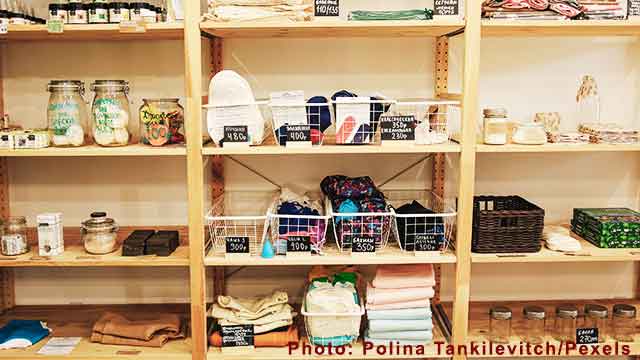Living a sustainable lifestyle involves making conscious choices that reduce our impact on the environment. By adopting simple sustainable swaps in our everyday lives, we can contribute to a healthier planet. Here are some examples of simple swaps that we can incorporate into our daily lives:
Plastic Water Bottles to Reusable Water Bottles:
Replace single-use plastic water bottles with reusable ones made from stainless steel or glass. It reduces plastic waste and saves money in the long run.
Disposable Plastic Bags to Reusable Shopping Bags:
Carry reusable shopping bags when you go grocery shopping instead of using disposable plastic bags. This reduces plastic pollution and promotes sustainability.
Disposable Plastic Cutlery to Bamboo or Stainless Steel Cutlery:
Swap single-use plastic cutlery for durable alternatives made from bamboo or stainless steel. They are reusable, durable, and help reduce plastic waste.
Plastic Straws to Stainless Steel or Bamboo Straws:
Replace plastic straws with reusable alternatives like stainless steel or bamboo straws. These are eco-friendly options that minimize plastic pollution.
Disposable Coffee Cups to Reusable Coffee Cups:
Opt for reusable coffee cups or travel mugs instead of disposable coffee cups. This reduces the waste generated by single-use cups and helps conserve resources.
Plastic Food Wrap to Beeswax Wraps:
Replace plastic food wrap with beeswax wraps. These natural alternatives are reusable, biodegradable, and keep your food fresh without harming the environment.
Chemical Cleaning Products to Homemade Cleaners:
Switch to homemade cleaners using ingredients like vinegar, baking soda, and lemon juice. They are effective, non-toxic, and reduce the use of harmful chemicals.
Paper Towels to Reusable Cloth Towels:
Ditch paper towels and use reusable cloth towels for cleaning and wiping. They can be washed and reused, reducing paper waste and saving money.
Disposable Menstrual Products to Menstrual Cups or Cloth Pads:
Transition from disposable menstrual products to reusable options like menstrual cups or cloth pads. They are cost-effective, reduce waste, and promote menstrual health.
Plastic Toothbrushes to Bamboo Toothbrushes:
Swap plastic toothbrushes with eco-friendly bamboo toothbrushes. Bamboo is a renewable resource and biodegradable, reducing plastic waste.
Disposable Cotton Rounds to Reusable Cotton Pads:
Use reusable cotton pads made from organic cotton instead of disposable cotton rounds. They are gentle on the skin and reduce waste.
Plastic Razors to Safety Razors:
Choose safety razors with replaceable blades instead of disposable plastic razors. They are durable, reduce plastic waste, and provide a closer shave.
Synthetic Air Fresheners to Natural Air Purifiers:
Replace synthetic air fresheners with natural alternatives like plants, essential oils, or activated charcoal. They purify the air without harmful chemicals.
Chemical-based Sunscreens to Mineral Sunscreens:
Switch to mineral sunscreens that use zinc oxide or titanium dioxide instead of chemical sunscreens. Mineral sunscreens are safer for your skin and the environment.
Fast Fashion to Sustainable Clothing:
Opt for sustainable clothing made from organic, recycled, or ethically sourced materials. It promotes fair trade, reduces textile waste, and supports responsible fashion practices.
Single-Use Batteries to Rechargeable Batteries:
Replace single-use batteries with rechargeable batteries. Rechargeable batteries are cost-effective, reduce hazardous waste, and conserve resources.
Incandescent Bulbs to LED Bulbs:
Swap incandescent light bulbs with energy-efficient LED bulbs. LED bulbs last longer, consume less energy, and reduce carbon emissions.
Plastic Food Containers to Glass or Stainless Steel Containers:
Use glass or stainless steel containers for storing food instead of plastic containers. They are safer, more durable, and help reduce plastic pollution.
Chemical Pesticides to Natural Pest Control:
Opt for natural pest control methods like companion planting, neem oil, or insect traps instead of chemical pesticides. It protects biodiversity and reduces chemical exposure.
Plastic Dish Scrubbers to Coconut or Loofah Scrubbers:
Replace plastic dish scrubbers with eco-friendly alternatives like coconut or loofah scrubbers. They are biodegradable, sustainable, and effective for cleaning.
Single-Use K-Cups to Reusable Coffee Pods:
Choose reusable coffee pods instead of single-use K-Cups. They reduce waste and allow you to use your favorite coffee grounds.
Disposable Cleaning Wipes to Washable Cleaning Cloths:
Switch from disposable cleaning wipes to washable cleaning cloths. They are reusable, effective, and reduce unnecessary waste.
Chemical Fertilizers to Organic Fertilizers:
Replace chemical fertilizers with organic options like compost or natural amendments. Organic fertilizers enrich the soil, promote plant health, and minimize environmental pollution.
Plastic Food Storage Bags to Silicone or Reusable Stasher Bags:
Ditch single-use plastic food storage bags and use silicone or reusable Stasher bags. They are leak-proof, durable, and help reduce plastic waste.
Disposable Diapers to Cloth Diapers:
Consider using cloth diapers instead of disposable diapers. Cloth diapers are reusable, reduce landfill waste, and are gentle on the baby’s skin.
Conventional Cotton to Organic Cotton:
Choose clothing made from organic cotton instead of conventional cotton. Organic cotton is grown without harmful pesticides, protecting both farmers and the environment.
Chemical Weed Killers to Manual Weed Removal:
Avoid chemical weed killers and manually remove weeds using tools like hoes or weed pullers. It prevents soil contamination and promotes sustainable weed control.
Single-Use Party Decorations to Reusable Decorations:
Use reusable party decorations instead of single-use ones. It reduces waste and allows for multiple uses, making celebrations more sustainable.
Disposable Plastic Food Utensils to Compostable Utensils:
When hosting events or parties, opt for compostable utensils made from materials like bamboo or compostable PLA instead of disposable plastic utensils.
Chemical Air Fresheners to Natural Room Fragrances:
Replace chemical air fresheners with natural room fragrances like simmering herbs, potpourri, or DIY essential oil diffusers. They create a fresh atmosphere without harmful chemicals.
